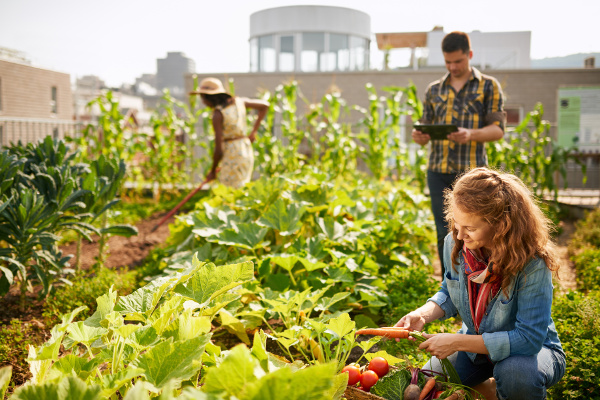Taking care of a vegetable garden can be very rewarding, but requires a considerable amount of time. Weeds and insects need to be controlled. Water and nutrients must be monitored and supplied if needed. Plants also must be given proper supports and must be harvested at the appropriate times. Keeping up with the needs of your garden will ensure a hearty harvest.
Weeds
Weeds, without a doubt, will limit production in your garden. They compete with your vegetables for water, nutrients, and sunlight. The easiest way to control weeds is to keep up with them and pull them or turn them into the garden soil before they develop seed and spread throughout your garden. They are easiest to remove when they are small or when the soil is moist. If hoeing or tilling in the garden, be sure to stay shallow to avoid damaging the roots of the vegetables.
Mulching
Mulch helps to control weeds and also to retain moisture. Black plastic can be used as a mulch, and will absorb the sunlight and speed up the warming of the garden soil. Apply the black plastic in strips after your garden soil has been prepared for planting. You can use soil to weigh down the edges and either cut slits in the plastic for the plants or use a bulb setter to cut holes in the plastic. Organic mulches also work well. Common organic mulches are leaves, straw, compost, sawdust, and grass clippings. If using grass clippings and leaves, be careful not to add weeds to the garden. Apply organic mulches 2-3 inches thick as they often reflect the sunlight due to their light color. They work best later in the year when the ground is warmed up or around plants that do well in colder weather. Garden centers carry many different varieties of mulching materials, many of which are biodegradable so that they can be turned into the soil at the end of the growing season.
Disease and Insect Control
Vegetable plants are susceptible to a wide variety of pests and diseases, which left untouched will limit the production and quality of your harvest, and could result in no vegetables at all. Keep a close eye on your vegetable plants to be sure to spot problems as soon as they arise. A small number of insects can sometimes be manually removed or hosed off. If you see a plant that looks to be diseased, remove it from your garden after harvest and be sure not to keep any seeds from a diseased plant. Do not crowd plants in the garden, and be sure to stake up tall heavy vegetable plants. Avoid watering your plants in the late afternoon, as wet plants are more susceptible to disease. When watered in the morning while the plants are already moist, they will dry during the morning hours as they naturally do every day.
Irrigation
Vegetable plants require approximately 1 to 2 ½ inches of water per week, depending on the plant and its size. Vegetables need less water when they are small and more when they become larger. During dry periods, be sure to irrigate with your garden hose. It may be a good idea to place a rain gauge in your garden to help monitor the amount of water your plants are getting.
